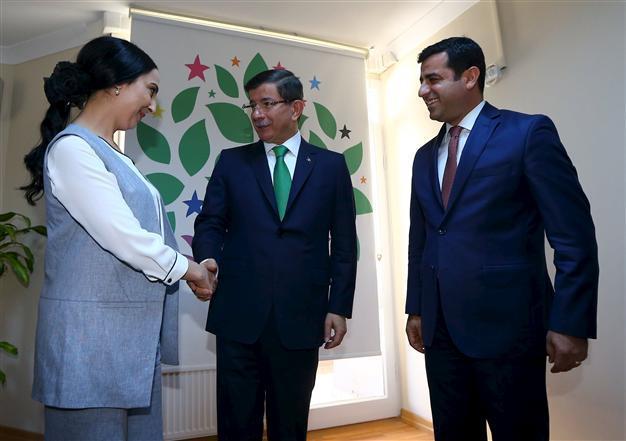Turkey's AKP breaks ice with HDP in first round of coalition talks
ANKARA

Turkey's Prime Minister Ahmet Davutoglu (C) meets co-chairs of the pro-Kurdish Peoples' Democratic Party (HDP) Selahattin Demirtas (R) and Figen Yuksekdag as part of the first round of coalition talks in Ankara, Turkey, July 15, 2015. Reuters Photo
Prime Minister Ahmet Davutoğlu has completed the first round of coalition talks with other party leaders, delivering warm messages after each of the three meetings, inevitably raising hopes for the second round that will be conducted next week despite the absence of any concrete commitments from any party.
Justice and Development Party (AKP) leader Davutoğlu’s visit to the headquarters of the Peoples’ Democratic Party’s (HDP) on July 15 was the third and last stop of his tour of other parties in a quest to form a coalition government. It was also the longest meeting so far, as it took longer than Davutoğlu’s meetings with both Republican People’s Party (CHP) leader Kemal Kılıçdaroğlu and Nationalist Movement Party (MHP) leader Devlet Bahçeli earlier this week.
The long-stalled peace process dominated messages separately delivered by Davutoğlu and HDP executives following their meeting, with the former choosing to place greater emphasis on the need to end the justification of violence for the sake of democracy.
“Disarmament will happen in Turkey one way or another. Let’s together make this happen. You make a call and then let all arms in Turkey be handed over,” Davutoğlu said at a press conference after the two-hour meeting.
His meeting with the party, which is focused on the Kurdish problem, came shortly after HDP co-chair Selahattin Demirtaş called on the outlawed Kurdistan Workers’ Party (PKK) to lay down its arms against Turkey, but also stressed that his call was not enough for a final solution.
“The way to stop the PKK from being a threat is through negotiations. If it is up to our call, I would make a call every now and then ... It’s not up to a call, but I am making a call here: The PKK must absolutely lay down arms against Turkey,” Demirtaş said on private broadcaster Habertürk late July 14.
Davutoğlu described Demirtaş’s call as “right” and “good,” arguing that it reflected the grassroots’ will as well.
Referring to their meeting, Davutoğlu quoted Demirtaş as saying, “As democracy grows, arms should gradually decrease to a minimum and then to zero.”
Davutoğlu said that although significant democratic reforms had been made in the AKP’s 13-year reign, there had been no disarmament.
According to Davutoğlu, if the peace process is to resume, then the HDP must have clout and make a contribution to disarmament; otherwise, the party will have no role to play in the process.
“That’s to say, if you have a clout, then you should display this clout for the laying down of arms,” he said.
Meanwhile, the AKP leader said he considered the HDP’s rhetoric had changed for the better since the June 7 election results showed the need for a coalition government.
“At today’s meeting, too, their approach was as, ‘We are ready to discuss everything with the AK Parti.’ Having this approach is appropriate,” Davutoğlu said.
During the meeting, Davutoğlu was accompanied by Deputy Prime Minister Yalçın Akdoğan, Food, Agriculture and Livestock Minister Mehdi Eker, former Interior Minister Efkan Ala, Adıyaman deputy Adnan Boynukara and Erzurum deputy Zehra Taşkesenlioğlu.
Demirtaş and the other co-chair of the HDP, Figen Yüksekdağ, hosted the AKP delegation along with HDP deputy parliamentary group chairs, İdris Baluken and Pervin Buldan and Ankara deputy Sırrı Süreyya Önder and a member of the party’s Central Executive Board (MYK), Zeynep Karaman.
Baluken, Buldan and Önder have been among the frequent visitors to jailed PKK leader Abdullah Öcalan as part of the government-led resolution process aimed at ending the three-decade conflict between Turkey’s security forces and PKK militants. Both Akdoğan and Ala have been visibly active during the process as well.
Elsewhere, speaking at a joint press conference with Baluken and Buldan, Önder described the meeting “open, transparent and useful.”
“We found the opportunity to convey our three fundamental principal approaches under the title of peace, democracy and justice,” Önder said. “We stated that we would assume a constructive opposition position vis-à-vis a formula of the AKP-CHP coalition should this coalition include these three titles,” he said, adding that they also decided to keep in contact as the two parties.
MHP leader Bahçeli, who met with Davutoğlu on July 14, meanwhile, released a written statement on July 15.
“Under today’s conditions in Turkey, the formation of a coalition by the AKP and the CHP should be accomplished without losing time. If this is not considered sufficient, then the HDP should also be affiliated in the partnership to be built,” Bahçeli said in a statement delivered to an online news site, etikhaber.
